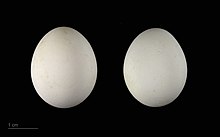Cockatiel
Cockatiels (binomial name Nymphicus hollandicus) are small birds originally from Australia and are related to many other cockatoos. They are the second most common bird species kept as a pet. Cockatiels can live from 10 to 25 years, depending on how healthy their lifestyle is, although wild cockatiels usually live shorter.
| Cockatiel | |
|---|---|

| |
| Scientific classification | |
| Kingdom: | |
| Phylum: | |
| Class: | |
| Order: | |
| Family: | |
| Subfamily: | |
| Genus: | Nymphicus |
| Species: | N. hollandicus
|
| Binomial name | |
| Nymphicus hollandicus | |
| Synonyms | |
|
Psittacus hollandicus | |

Cockatiels have tiny feathers on their head called a crest. The crest allows the owner to have an idea of what they are feeling; straight up if scared or excited, flat when they're angry, and slightly curved is normal/happy.
In the wild, cockatiels are prey animals, meaning there are predators that eat them. As a result, cockatiels can scare easily, especially when they meet someone or something they do not know. With enough patience and affection, an owner can tame the cockatiel and help them get over their natural fear. Like many other parrots, cockatiels are very good at climbing, and use their beak to position themselves each time.
Cockatiels come in many different colours, some naturally while others were specifically bred. Gray is considered to be their original colour, and is one of the most popular, along with Lutino (yellow). Males have a brighter crest and face, and sing louder and more frequently than females. A cockatiel has very long tail feathers compared to other birds.
Seeds make up most of their diet, but veterinarians strongly recommend various fruits, vegetables, and beans as well. However, a few of these may be harmful to them, and it is advised to be cautious with what they eat. It can be very hard to get adults to try new foods, so it is best to have them try little by little at a time instead of all at once.
Like other birds, they can be taught to do many tricks; including flips, handshakes, fly-on-command, showing their wings, and more. Patience and repetition is key, as teaching one trick can take many months. They can also be taught to sing, but may become confused and ruin the song if it's too complex.
Cockatiels are social birds, and like to spend time with others. They can become overly attached to their owners over time (especially if raised young), and may start to shriek when they feel lonely. If the owner is unable to spend a lot of time with them, getting them a partner (preferably another cockatiel) can help resolve their clinginess.
Cockatiels are Australian psittacines native to the deserts (Forshaw, 2010). They are genetically adapted to high temperatures, amid centuries of domestication
Source
change- Carvalho, T.S.G.; Zangeronimo, M.G.; Saad, C.E.P.; Alvarenga, R.R.; Assis, V.D.L.; Pereira, V.M.; Scalon, J.D.; Silva, J.P. (November–December 2015) [7 August 2014]. "Comportamento de calopsita (Nymphicus hollandicus) sob duas temperaturas em cativeiro" [Behaviour of cockatiels (Nymphicus hollandicus) at two temperatures in captivity]. Animal Science and Technology and Inspection of Animal Products. 67 (6): 1669–1674. doi:10.1590/1678-4162-7892. Retrieved 2024-09-18 – via Arquivo Brasileiro de Medicina Veterinária e Zootecnia.
{{cite journal}}: CS1 maint: date and year (link)